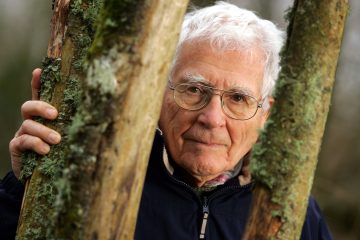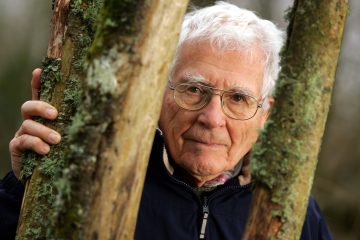Table of Contents
- Exploring the Philosophy of Enjoying Life Through James Lovelocks Lens
- The Connection Between Nature and Well-Being According to Lovelock
- Practical Tips for Embracing a Sustainable Lifestyle Inspired by Lovelock
- How Technology Can Enhance Our Enjoyment of Life While Protecting the Planet
- Cultivating a Conscious Mindset: Lessons from James Lovelock on Happiness
- Q&A
- To Conclude
Exploring the Philosophy of Enjoying Life Through James Lovelocks Lens
James Lovelock, as a visionary scientist and environmental thinker, offers a unique perspective on how to savor life amid the complexities of the modern world. His Gaia theory positions Earth as a self-regulating organism, prompting us to reconsider our relationship with nature. Embracing this philosophy means recognizing that individual well-being is deeply interconnected with the health of our planet. We find joy not only in personal pursuits but in nurturing the ecosystems that support us, emphasizing a holistic approach to happiness that celebrates life in its myriad forms.
To enjoy life through Lovelock’s lens, consider adopting practices that align with natural processes. Here are a few principles derived from his insights:
- Regenerative Living: Choose sustainable habits that help restore the environment.
- Mindfulness in Nature: Spend time outdoors to cultivate a deeper appreciation for the ecosystems surrounding you.
- Community Engagement: Build connections with like-minded individuals committed to environmental stewardship and shared happiness.
Moreover, understanding Lovelock’s vision encourages us to adopt a proactive stance towards joy and fulfillment. We can refer to his core ideas through the following table:
| Core Idea | Application in Daily Life |
|---|---|
| Interdependence | Recognize how personal choices affect global ecosystems. |
| Balance | Strive for harmony between consumption and conservation. |
| Resilience | Cultivate adaptability in your lifestyle to face environmental challenges. |

The Connection Between Nature and Well-Being According to Lovelock
James Lovelock, the renowned scientist and environmentalist, emphasizes the intrinsic bond between humanity and the natural world. He posits that our well-being is intricately linked to the health of our environment, suggesting a symbiotic relationship where both can thrive or suffer together. This connection is not merely philosophical; it has profound implications for how we engage with the Earth and each other. The less we acknowledge nature’s role in our lives, the more we risk our own psychological and physical health.
In Lovelock’s view, immersing ourselves in natural surroundings can lead to significant improvements in our mental state. The benefits he highlights include:
- Stress reduction: Engaging with nature has been shown to lower cortisol levels, promoting relaxation.
- Enhanced creativity: Natural environments stimulate creative thinking and problem-solving skills.
- Physical rejuvenation: Outdoor activities promote physical health, which in turn supports mental well-being.
These observations align with a growing body of research that supports the idea that nature plays a crucial role in improving our mental health. Lovelock encourages individuals to experience nature not just as a backdrop to our lives but as a vital component of flourishing. As we venture outdoors, we engage more fully with life, fostering connections that nourish both our spirit and our physical being.
Moreover, understanding this relationship has implications for future societal choices regarding urban development and conservation efforts. By fostering environments that embrace greenery and biodiversity, we can create spaces that support mental health and overall well-being. A comparison of urban versus natural environments can illustrate this point:
| Environment Type | Impact on Well-Being |
|---|---|
| Urban | Higher stress, lower creativity |
| Natural | Lower stress, enhanced creativity |
As we continue to navigate the complexities of modern life, Lovelock’s insights challenge us to rethink our relationship with the environment. Emphasizing that maintaining a healthy connection with nature is essential not just for ecological sustainability, but for our personal well-being, invites us all to consider how we can integrate more natural experiences into our daily routines.

Practical Tips for Embracing a Sustainable Lifestyle Inspired by Lovelock
Embracing sustainability in everyday life can often feel overwhelming, but by taking small yet impactful steps, we can create positive changes. One effective approach is to reduce waste wherever possible. Consider adopting practices such as:
- Using reusable bags, bottles, and containers to minimize plastic usage.
- Composting organic waste to enrich your garden soil while reducing landfill contributions.
- Choosing products with minimal or recyclable packaging.
Furthermore, supporting local and sustainable brands not only bolsters your community but also decreases carbon footprints caused by transportation. Here are some key actions you can take:
- Visit farmers’ markets to purchase fresh produce directly from local growers.
- Opt for clothing from environmentally conscious companies.
- Participate in community-supported agriculture (CSA) programs.
integrating mindful consumption into your routine encourages more thoughtful choices. This can include keeping a journal to track your purchases and consequences, as well as evaluating the necessity of each item. To guide your journey, consider the following:
| Action | Benefit |
|---|---|
| Evaluate purchases | Reduces impulse buys and waste |
| Choose quality over quantity | Longer-lasting products save resources |
| Share ideas with others | Fosters a community focused on sustainability |

How Technology Can Enhance Our Enjoyment of Life While Protecting the Planet
In today’s rapidly evolving world, technology stands as a beacon of hope for enhancing our everyday experiences while fostering environmental consciousness. By integrating sustainable innovations into our lives, we can significantly reduce our carbon footprint and promote a more balanced relationship with nature. For instance, advancements in renewable energy sources such as solar and wind power have made it easier for individuals and communities to adopt cleaner energy solutions, minimizing our reliance on fossil fuels.
Moreover, smart home technologies allow us to control energy usage more efficiently, ensuring we only consume what we need. Smart thermostats and lighting systems can reduce energy waste significantly. Additionally, incorporating electric vehicles into our daily commutes not only contributes to air quality improvement but also aligns with a lifestyle that cherishes minimal environmental impact. Embracing these technologies empowers individuals to take actionable steps toward sustainability without sacrificing comfort or convenience.
Furthermore, the rise of eco-friendly mobile applications is transforming how we engage with the environment. These apps can help users track their carbon emissions, find local green initiatives, and even connect with like-minded individuals to build a community around sustainability. By prioritizing eco-conscious choices, we not only elevate our quality of life but also contribute to a flourishing planet. Embracing such technologies creates a harmonious balance, where personal enjoyment and environmental stewardship coexist seamlessly.

Cultivating a Conscious Mindset: Lessons from James Lovelock on Happiness
James Lovelock, the renowned scientist and environmentalist, offers us a profound lens through which to explore happiness and fulfillment. His philosophy centers on the interconnectedness of all life, suggesting that true happiness stems from a deep understanding of our relationship with nature. To cultivate a conscious mindset, one must recognize the importance of living harmoniously with the environment. This awareness not only fosters gratitude but also encourages sustainable practices that benefit both our planet and our overall well-being.
In embracing Lovelock’s insights, we can adopt several practical strategies that enhance our consciousness and enrich our lives:
- Mindful Observation: Spend time in nature, observing its complexities and appreciating the beauty around you. This practice can help ground your thoughts and bring a sense of peace.
- Embrace Simplicity: By simplifying our lives, we reduce distractions and find joy in the present moment. Focus on what truly matters, like nurturing relationships and investing in experiences rather than material possessions.
- Support Local Ecosystems: Engage with local environmental initiatives. By investing your time and resources in your community, you cultivate a sense of belonging and purpose, contributing to collective happiness.
To further illustrate the impact of Lovelock’s teachings, consider the following table that summarizes key elements of a conscious mindset and their corresponding benefits:
| Element | Benefits |
|---|---|
| Mindful Living | Increased awareness of the present moment, leading to reduced anxiety and greater contentment. |
| Ecological Awareness | Enhanced appreciation for natural resources, fostering a sense of responsibility for the environment. |
| Community Engagement | Strengthened social connections, creating a network of support that contributes to overall happiness. |



0 Comments